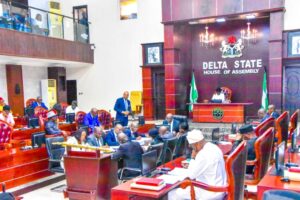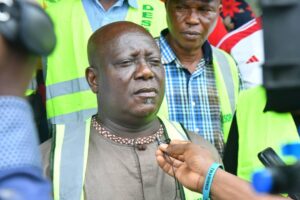IS NIGERIA STILL REDEEMABLE?
By Zik Gbemre
With an estimated population of over 180 million people, and being a multi-ethnic, multi-cultural diversity with about 527 languages (seven of which are extinct), and over 1,150 dialects; Nigeria can be said to be one of the most complicated and complex countries in the world. Hence, it is not gain saying that the boundary of this former British colony called Nigeria was drawn to serve commercial interests, largely without regard for the territorial claims of the diverse indigenous people. As a result, we now have before us a country whose unity has been consistently come under siege. In fact, there have been eight attempts at secession that threatened national unity between 1914 and 1977. The epic of which is the Nigerian civil war. Yet, the ‘potentiality’ in the country’s diversity as a nation, has made it still an envy by many.
Perhaps, this diversity and complexities of the make-up of Nigeria, explains the reason why the issue of nepotism, favouritism, ethnicitism, religion and political affiliations have been the attributing factors that have made the nation not to have political leaders that ought to be elected/appointed on merit to effectively and efficiently lead the country to great heights. These issues, have ‘blinded’ both the government and the governed from making sound and good judgements in the appropriation of public resources for the good of all and sundry by those in authorities, and in demanding such when they are not getting it right by those being governed. In other words, it is as if our multi-cultural bearings have over the years, made us to be more self-serving/self-centered when it comes to governance and the appropriation of our collective wealth as a people in the entity called Nigeria. This often times makes us wonder: will Nigeria ever become a great and admirable nation? Will Nigeria ever be able to overcome its diversity and complexity and become a ‘united front’ in global affairs to reckon with? Or has Nigeria gone beyond being redeemed?
Is it not an irony, and almost an enigma that, despite Nigeria’s vast natural resources and enormous human potentials across all boards; the gap between the poor and the rich, the haves and the have-nots, the governed and the government – keeps increasing and expanding rather than closing-up. One would have thought that, considering how ‘blessed’ Nigeria is, the issues of life-threatening poverty, hardship, underdevelopment and backwardness will not be that prevailing in the country. The most annoying part of this pathetic situation in Nigeria is that it seems as if our Nigerian political leaders at all levels, especially from 1999 to date; are hardly moved emotionally, empathetic or even understand how bad the poverty and underdevelopment situation is in the country. Many of them, do not even have an iota of idea of the sort of sufferings, hardship and poverty countless Nigerians are made to grapple and deal with every day of their lives, which is as a result of their actions/inactions, decisions/indecisions. We are certain that if they really do care, as political leaders and custodians of the nation’s wealth, they would not be doing a lot of the things they heartlessly do in the name of ‘government work’.
It is only in Nigeria that the unthinkable, unimaginable, the absurd, and the unreasonable are seen playing out across all boards as ‘normal’, and no one dares to question or raise a brow about it. When you do, you are tagged a trouble-maker, and you even become a target for potential harm to come upon you and your family.
Take our electoral system for example. Since 1964, elections in Nigeria have been very problematic, chaotic, burdensome and unpleasant, where; ballot boxes often develop wings and losers are declared winners by the electoral commission. When those boxes resurface at the counting centres, they are stuffed with multiple thump-printed ballot papers. Results declared at the polling centres are usually at variance with those submitted at the collation centre. For instance, in past Council and State Governorship elections in Delta State, one of the easiest ways politicians are known to manipulate election results in their favour, is to inflate election results coming from the riverine and interior areas of the State, where International/Domestic Election Observers often do not reach or go to during elections. In other words, scarcely populated interior and riverine areas are made to end up having unrealistic (populated) figures of voters. In other words, though these rural areas are scarcely populated, but officially they have been made the most populated areas. That is the situation in all the States across the federation. So, this is not an issue of having PVC or not. Its about how the political class have been able to constantly manipulate their electoral process in their favour. There are even a lot of ‘imaginary wards’ created by these politicians just to have their way.
The one that troubles us most is the normalized pattern of voting public office holders. The observed voting pattern in Nigeria, is never really about who will lead well, or who actually has what it takes to deliver good governance in the interest of the general populace. The voting pattern is about who is our brother/sister (from the same ethnicity or religious background), or who is our Oga/boss (from who all sorts of goodies are expected to flow). Some even vote because it is either a ‘broom’ or an ‘umbrella’ – not because they know the character or the capacity of the politician in question. That is the pathetic situation we find across the nation, especially in the rural areas. So, even when the people know within themselves that those vying for one political portfolio or the other, are of questionable characters and without integrity, they still blindly vote for them according to either of the described pattern above. What that leaves us with are political office holders who practically do not understand what it really means to serve the public. That is why all we have had, especially since the current democratic dispensation, are public office holders who are best described as ‘Public Masters’ and not ‘Public Servants’ like we see in developed societies.
Then there is the issue of gross endemic-high-profile corruption which is often driven by insatiable greed and sheer wickedness. This ‘disease’, not only pervades the entire political space across all levels of government, but it is also very evident within and amongst the general populace. Those who have dared to fight this disease, or expose those involved, are usually made to taste the bitterness of stepping on the toes of the untouchables. Ask Nuhu Ribadu, ask Ngozi Okonjo-Iweala and the likes, and they will give their sad tale account in this regard. In the words of Ngozi Okonjo-Iweala: “Fighting Corruption Is Dangerous In Nigeria” – which actually the title of her latest book. This disease, has made many to sell their birthrights for a pot of porridge; it has made many to smear their conscience with hot iron so as not to feel any iota of empathy and pity for others; it has thrown the spirit of patriotism and brotherliness outside the window. In fact, it is lack of patriotism, which cuts across tribe, religion, age, and status, that makes public officials steal and loot the nations resources at will. It is the reason we see some obviously ignorant people and society elites’ queue behind, defend and support a recognized “national thief” simply because that person is from their tribe, or religion or of the same political affiliation. This problem of patriotism and the lack thereof amongst Nigeria’s political leaders, is far more devastating and damaging at that level since they are the supposed custodians of the nation’s resources. However, it is not only within the political leaders, but the followers as well. Patriotic followers can check the excesses of unpatriotic political leaders, but in the Nigerian situation, the followers also lack patriotism as much the political leaders do.
It is only in Nigeria that we see political leaders that are obviously corrupt (both alleged and convicted), daily praised, supported and followed by many people. We have seen situations where a former top State Government Official is being escorted to a social event by over 50 “hefty henchmen”, and also a serving Public Official escorted by over 100 hefty henchmen and their heavy-security aides to another social event. The saddest part is that these ‘hangers’ also have their own hangers around them. At the end of the day, you have one politician, always surrounded by hundreds of persons wherever they go. That means, these over 50 to 100 hefty men and hangers are all jobless. Imagine a family man, taking the ‘coined job’ of always escorting an ill-gotten-wealthy serving/former politician in and outside political power, to attend social events without being invited. That is how bad the situation has gotten to. All they do as ‘hangers’, is to escort these politicians wherever they go, including social events where they sit behind their ‘Oga Politician’, or stand outside the main hall of the social event center. Where they wait to escort him back home or wherever he goes. These hangers usually assembly in the morning hours and outside the “home mansion” of their Oga Politician/big man, waiting to escort him wherever he goes. Those who take such jobs as ‘hangers’, are happy that they escort a big man/politician to social events without being invited. Not that these henchmen/hefty men escorting the big politician are Security Operatives, they are nothing but “idiotic hangers” employees.
The question is, why can’t these “political ogas” use their stolen wealth to build factories and car assembly plants for instance, which would gainfully employ the crowd of persons that follow them everywhere they go, both day and night? For how long will such persons be roaming and escorting political leaders from place to another? What about when they get old? Will they still have the energy and strength to be escorting politicians? Is it not ironic and a sad tale, that the same set of few powerful politicians who stole the collective wealth of the masses, are still being followed, praised and hailed by all kinds of big titles like Double-Chief, Triple-Chief, My Leader, Governor-For-Life, etc. What a shame!
There is also the way everything is attached/aligned to politics in the country, as such, laudable infrastructural projects, programmes and policies that ought to benefit the Nigerian people, are usually unevenly distributed, distorted, unjustly carried out, marginalized, diverted, robbed, seen as an avenue for pilfering the public purse, etc. Take the situation with the Warri Port (Delta Port Complex) in Delta State for instance, where some powerful persons within the government circle, have ensured that cargo ships are diverted to the Onne Ports instead of the Warri Port, which is the closest to the Atlantic Ocean. Not to mention the fact that these persons have also been trying to frustrate and thwart the Government plans to dredge the Escravos bar and navigational tools to allow bigger vessels into the Warri Port. And so it is with many other infrastructural projects and programmes across the length and breadth of the country. At the end of the day, it is the general populace that suffers the most at the receiving end, while those behind these atrocities and cheating, are made richer to the detriment of all.
Perhaps, we can attribute all the unhealthy and anti-development prevailing circumstances around the polity to the root factor of our diversity and multiplicity of cultures, ethnicity, languages and religious backgrounds. We believe that is why every ‘action’ and ‘inaction’, every ‘decision’ and indecision’ – be it of the government of the day or at any level of the public and private sector space – are viewed through the lens of ‘distrust’ and ‘suspicion’. Nobody seems to trust anybody that is not of their own stock. The said distrust is even amongst those of the same tribe and religion. This brings us back to the issue of ‘No Patriotism’ and ‘No Commitment to serve the interest of others’ – every man/woman for his/her selfish-self and those around them. But with even with people ‘Not being content with what they have’, it is still a huge problem. These and many more make us to wonder if Nigeria is still redeemable?
Truth be told, except there is some ‘divine intervention’, we really fear the worse for this nation’s overall growth and holistic development that will benefit all. Which is why many believe that perhaps, a well-thought-out-people-
When we consider the cacophony of voices across the country, which have condensed to one singular issue, and that is ‘restructuring’ (for, and against the idea) – is suggestive of the fact that indeed, Nigeria has been drifting away from being a united country to a divided country, and as such, whether the political leadership across the country like or not, we have serious problems on our hands that should not be treated with kid gloves. The contentious topic of how to restructure Nigeria and make governance more efficient has refused to go away, despite strident efforts by some to deny the need and urgency for restructuring to take place.
Hardly can anyone think of the seemingly intractable tragedies of the Nigerian nation nowadays without a deep-seated anger, frustration and prolonged lamentation. This brings to mind a statement made some years back by the universally celebrated author of Things Fall Apart, Chinua Achebe, who, seeing the tragic madness that had repeated itself a zillion time in Nigeria’s past, gave vent to the lamentation of his heart which in fact spoke directly and eloquently about how things had completely fallen apart in his beloved country of Nigeria. According to Achebe, “Nigeria has been more disappointing than I had hoped or expected…. It is tragic because we have such potential … we have been given so much abundance by providence that it just seems extraordinary that we should do nothing but shoot ourselves in the foot….”
After all said and done, we strongly believe that the multifaceted challenges facing Nigeria are not irredeemable, as Nigerians are fundamentally good and hardworking people who can turn around the bad image of the country that are given by other few unscrupulous elements. As noted by former Finance Minister, Ngozi Okonjo-Iweala, “the majority of Nigerians are honest, hardworking people, but Nigeria is being held hostage by some minority of people. Why should we give up? That is what they want. They want everybody to give up, when you try to fight the corruption they attack you viciously. And then they get away with it. And am trying to say… we must not do that, and to give people examples where you could actually block it even with threats to your life, to your relatives. Am not saying that everybody should take that risk, but at the end of the day, some people have to stand up too, and actually there are other people standing up every day…”
For Kenyan anti-corruption crusader, Prof. Patrick Loch Otieno (PLO) Lumumba, while advising African leaders, particularly President Muhammadu Buhari in one of his well-circulated online interview videos, he said: “What President Buhari and indeed any other leaders in the world must do (to fight corruption), is to recruit the population. If the population has been welded to the idea that corruption is a bad thing, then that is the beginning of the success of that battle… impunity is well and alive in Africa. And we the electorates, as I have said times without number, are in the business of celebrating thieves. We must stop this! We camouflaged theft, by giving it modernized English names like ‘money laundering’, ‘fraud’, ‘embezzlement’, and all those venial that makes them look as if it is some kind of nice game. Let us call these men and women by the right name, they are Thieves – stealing on an industrial scale. They are murderers. And once we begin to call them by that and mount it on their forehead, and we shun them…it has been done in other African countries…such as Tanzania they have been dealt with, in Rwanda they have been dealt with, in Mauritius they have been dealt with, in Botswana they have been dealt with. Once we begin to deal with them like this, then the others will that may want to behave like them may begin to take cue… That is the only way Africa will realize their potential.” – We believe this strong advice, is for the Nigerian populace, and we should really take heed to, if we desire to redeem this country.
Zik Gbemre, JP.
National Coordinator
Niger Delta Peace Coalition (NDPC)




